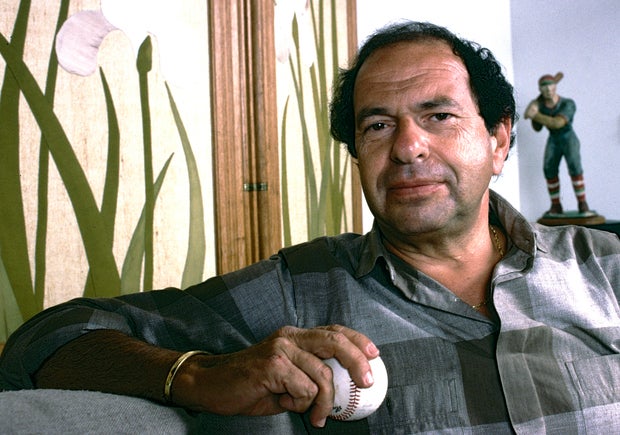CBS News
Dick Moss, lawyer behind free agency in baseball who revolutionized pro sports pay, dies at 93

New York — Dick Moss, the lawyer who won the arbitration case that created free agency for baseball players and revolutionized pay for professional athletes, has died. He was 93.
Moss died Saturday at an assisted-living residence in Santa Monica, California, the Major League Baseball Players Association said Sunday. He had been in poor health for several years.
Hired by union executive director Marvin Miller as general counsel in 1967, Moss argued the 1975 case involving pitchers Andy Messersmith and Dave McNally that led to arbitrator Peter Seitz striking down the reserve clause. That provision for a unilateral one-year renewal had been included in every contract since 1878 and had enabled teams to control players by maintaining those agreements could be extended perpetually.
Bob Riha, Jr./Getty
Seitz decided on Dec. 23, 1975, the clause meant only a single one-year renewal. The decision impacted all sports across North America and led to collectively bargained free agency in baseball.
“A titan of the industry. He impacted the industry at that time like few others,” said David Cone, a pitcher who was a member of the union leadership and a Moss client. “A bit eccentric, but very fun loving, just a gregarious personality, great guy to be around. Life of the party, a great guy to have a drink with.”
At the time of Seitz’s decision, the average Major League Baseball salary was just under $45,000. It rose to $76,000 in 1977 and by 2023 was $4.5 million, a 1,000-fold increase.
MLB’s revenues increased at a less steep rate, from $163 million in 1975 to more than $11 billion in 2023, a 70-fold rise.
“The difference between winning and losing was billions and billions of dollars, maybe tens of billions of dollars,” Moss said at a 25th anniversary party he threw in December 2000.
Baseball players’ gains were followed closely by other sports, with unions gaining liberalized free agency rights in the NBA in 1976 and the NFL in 1993.
Richard Maurice Moss III was born in Pittsburgh on July 30, 1931. He received degrees from the University of Pittsburgh and Harvard Law School.
After two years in the Army, Moss worked for a Pittsburgh law firm, became a Pennsylvania assistant attorney general and in 1963 joined the United Steelworkers as an associate general counsel on a staff where Miller was assistant to union president David McDonald.
Miller was hired by the baseball union in 1966 and Moss joined him six months later. As Miller organized the players into a stubborn unit, Moss negotiated the first collective bargaining agreement in 1968, raising the minimum salary from $6,000 to $10,000. The 1970 agreement added grievance arbitration and the 1973 deal instituted salary arbitration.
“Marvin was really the perfect man for that time,” Moss told The Associated Press in 1991. “The players trusted him. He instilled confidence and respect in the players, and he was something of a father figure to them.”
Players showed their resolve during strikes in 1972 and ’73 and a lockout in 1976. A lawsuit by Curt Flood seeking to end baseball’s antitrust exemption lost at the U.S. Supreme Court in 1972.
The first big breakthrough came in December 1974, when Seitz ruled in an arbitration that Oakland had breached the contract of Catfish Hunter by failing to make a $50,000 payment into a long-term annuity fund and he declared Hunter a free agent. The New York Yankees signed him to a $3.2 million, five-year deal, a sign of what players could earn without restrictions.
“Dick managed to win that case establishing something novel for baseball, the first real free agent who didn’t get there by being released,” said Donald Fehr, who worked under Miller and Moss, then headed the players’ association from 1983 to 2009. “The magnitude of the restraint was demonstrated.”
When Messersmith and McNally played seasons without contracts, the union filed grievances and Moss argued the cases before Seitz on Nov. 21 and 24 and Dec. 1, 1975. Seitz issued his decision on Dec. 23, ruling “there is no contractual bond between these players and the Los Angeles and the Montreal clubs, respectively. Absent such a contract, their clubs had no right or power … to reserve their services for their exclusive use for any period beyond the ‘renewal year’ in the contracts which these players had heretofore signed.”
Seitz’s decision was upheld by U.S. District Judge John W. Oliver in Kansas City, Missouri, and the 8th U.S. Circuit Court of Appeals. where Moss conducted the oral argument on the union’s behalf. Free agency rules were agreed to in the labor contract of July 1976, and the first free-agent class to gain riches included future Hall of Famers Reggie Jackson and Rollie Fingers.
Miller educated players on how to achieve their goals and Moss developed the legal tactics.
“Working in tandem was exactly what built the solid foundation,” said former pitcher Steve Rogers, a Moss client and longtime union official. “None of what is happening today exists without the solid foundation.”
Moss quit the union in July 1977 to become an agent, and his clients included future Hall of Famers Nolan Ryan, Jack Morris and Gary Carter. He negotiated Ryan’s deal for the first $1 million annual salary in 1979 and argued the case that got Fernando Valenzuela the first $1 million salary in arbitration in 1982.
In 1987, he helped expose owners’ collusive activities by giving the Chicago Cubs a blank contract for Andre Dawson, which the team filled in with a $500,000 base salary plus bonus opportunities. Owners lost three grievances and settled the cases with the union in 1990 for $280 million.
In 1992, he helped argue the grievance that led arbitrator George Nicolau to overturn Steve Howe’s lifetime ban, the pitcher’s seventh suspension for substance abuse. In both 1989 and 1994, he worked to organize a new league without ever getting teams on a field.
He is survived by his third wife, Carol Freis, whom he married in 1980, and a daughter from his second marriage, to Rolinda, Nancy Moss Ephron. Another daughter from his second marriage, Betsy, predeceased him.
CBS News
Texas man executed for killing infant son after waiving right to appeal death sentence

HUNTSVILLE — A Texas man who had waived his right to appeal his death sentence was put to death Tuesday evening for killing his 3-month-old son more than 16 years ago, one of five executions scheduled within a week’s time in the U.S.
AP
Travis Mullis, 38, received a lethal injection at the state penitentiary in Huntsville and was pronounced dead at 7:01 p.m. CDT. He was condemned for stomping to death his son Alijah in January 2008.
Mullis was the fourth inmate put to death this year in Texas, the nation’s busiest capital punishment state. Another execution was carried out Tuesday evening in Missouri, and on Thursday, executions were scheduled to take place in Oklahoma and Alabama. South Carolina conducted an execution Friday.
Authorities said Mullis, then 21 and living in Brazoria County, drove to nearby Galveston with his son after fighting with his girlfriend. Mullis parked his car and sexually assaulted his son. After the infant began to cry uncontrollably, Mullis began strangling the child before taking him out of the car and stomping on his head, according to authorities.
The infant’s body was later found on the roadside. Mullis fled the state but was later arrested after surrendering to police in Philadelphia.
Mullis’ execution proceeded after one of his attorneys, Shawn Nolan, said he planned no late appeals in a bid to spare the inmate’s life. Nolan also said in a statement Tuesday afternoon that Texas would be executing a “redeemed man” who has always accepted responsibility for committing “an awful crime.”
“He never had a chance at life being abandoned by his parents and then severely abused by his adoptive father starting at age three. During his decade and a half on death row, he spent countless hours working on his redemption. And he achieved it. The Travis that Texas wanted to kill is long gone. Rest in Peace TJ,” Nolan said.
Mullis declined an offer earlier in the day to phone his attorney from a holding cell outside the death chamber, said Texas Department of Criminal Justice spokeswoman Hannah Haney. His lawyers also did not file a clemency petition with the Texas Board of Pardons and Paroles.
In a letter submitted in February to U.S. District Judge George Hanks in Houston, Mullis wrote that he had no desire to challenge his case any further. Mullis has previously taken responsibility for his son’s death and has said “his punishment fit the crime.”
At Mullis’ trial, prosecutors said Mullis was a “monster” who manipulated people, was deceitful and refused the medical and psychiatric help he had been offered.
Since his conviction in 2011, Mullis has long been at odds with his various attorneys over whether to appeal his case. At times, Mullis had asked that his appeals be waived, only to later change his mind.
Nolan had previously told the 5th U.S. Circuit Court of Appeals during a June 2023 hearing that state courts in Texas had erred in ruling that Mullis had been mentally competent when he had waived his right to appeal his case about a decade earlier.
Nolan told the appeals court that Mullis has been treated for “profound mental illness” since he was 3 years old, was sexually abused as a child and is “severely bipolar,” leading him to change his mind about appealing.
Natalie Thompson, who at the time was with the Texas Attorney General’s Office, told the appeals court that Mullis understood what he was doing and could go against his lawyers’ advice “even if he’s suffering from mental illness.”
The appeals court upheld Hank’s ruling from 2021 that found Mullis “repeatedly competently chose to waive review” of his death sentence.
The U.S. Supreme Court has prohibited the application of the death penalty for the intellectually disabled, but not for people with serious mental illness.
If the remaining executions in Texas, Alabama and Oklahoma are carried out as planned, it will mark the first time in more than 20 years — since July 2003 — that five were held in seven days, according to the nonprofit Death Penalty Information Center, which takes no position on capital punishment but has criticized the way states carry out executions.
The first took place Friday when South Carolina put inmate Freddie Owens to death. Also Tuesday, Marcellus Williams was executed in Missouri. On Thursday, executions are scheduled for Alan Miller in Alabama and Emmanuel Littlejohn in Oklahoma.
CBS News
9/24: CBS Evening News – CBS News

Watch CBS News
Be the first to know
Get browser notifications for breaking news, live events, and exclusive reporting.
CBS News
9/24: The Daily Report with John Dickerson

Watch CBS News
Be the first to know
Get browser notifications for breaking news, live events, and exclusive reporting.










